IWD: Becky Adlington On Four Olympic Medals, Being Speechless In Beijing & ‘Ultimate Athlete’ Ledecky
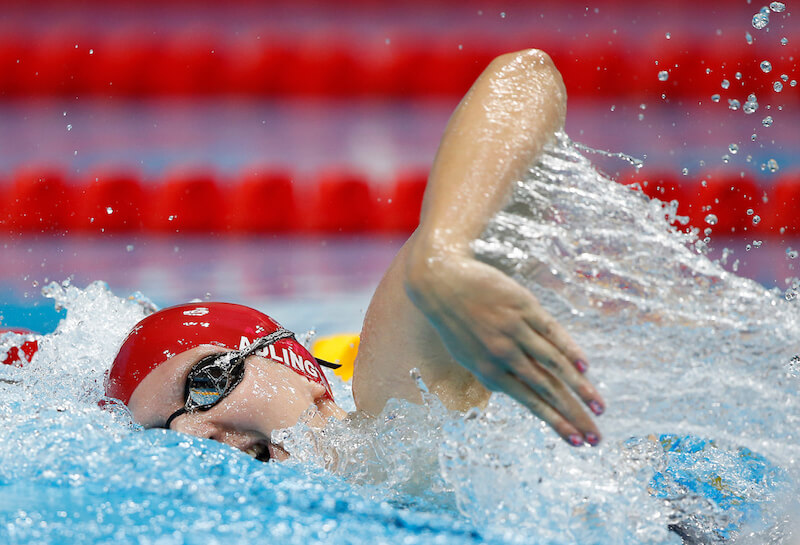
International Women’s Day (IWD)
To mark International Women’s Day, Swimming World is rolling out a series of features this Sunday, fresh and from the archive, to highlight the achievements and work of pathfinders in swimming and raising issues that continue to have a massive impact on women in sport.
So far in our celebration of IWD 2020:
- IWD: An Ode To Swim Moms
- IWD: Freya Anderson On London 2012 Lighting The Fire, Beating Her Idols & Embracing Nerves
- IWD: When Cate Campbell Called Out ‘Arrogant’ FINA Leaders For Losing Sight Of Athletes In Pursuit Of Money
- IWD – Takeoff to Tokyo: Fraser’s Trifecta In Tokyo Capped the Dawn of Greatness
- IWD – 2020s Vision: Dr. Shane Gould On Swimming Culture After A Lifetime Of Learning
- IWD – Nancy Hogshead-Makar, Rape Survivor & Fighter For An End To Abuse in Sport
Here we consider the career of Becky Adlington who retired in February 2013 as Britain’s most successful Olympic swimmer of the modern era.
Adlington won two golds in Beijing in 2008 which she followed up with two bronze medals four years later at a home Games in London. Four finals, four medals. Some record.
There were world, European and Commonwealth titles as well as an 800m world record which stood until 2013 when a certain Katie Ledecky smashed through the barrier and has subsequently pushed it into uncharted territory.
Guided from the age of 12 by Bill Furniss – now the Great Britain head coach – at the Nova Centurion club in Nottingham, Adlington looks back at her journey to the Olympic podium, the unexpected spotlight and the woman she so respects in and out of the water.
Picture the scene. It’s August 2004 in Rhodes where the Mediterranean meets the Aegean Sea. The sun is shining in a blue sky.
Holidaymakers are enjoying the island’s natural beauty and ancient civilisation. Among them are the Adlingtons, parents Steve and Kay along with daughters Chloe and Laura. But their 15-year-old sister is nowhere to be seen.
That’s because Becky is in her room in front of the TV completely engrossed in the Olympics taking place a one-hour flight away in Athens.
She told Swimming World:
“My mum and dad kept telling me off because I was just in the room the whole time watching the Olympics.
“I was 15, I was really into the sport, I had just met the Olympic team and I felt like I really wanted to cheer on my friends, not just anyone.
“I was 11 when the Olympics were in Sydney and we didn’t do that great and I don’t remember watching it.
“The first time I properly sat down and watched the Olympics and I was glued to it was when I was much older.
“Most people remember something from like when they were eight or nine or whatever whereas I don’t really remember that.”
By that time, Adlington was already on the pathway that would lead to the top of the Olympic podium.
She had been second in the 800 free to Becky Cooke at the Olympic trials in Sheffield, albeit well outside the selection time, before going on to win the European junior 800m freestyle title in the Portuguese capital Lisbon in July as a certain Lotte Friis – who would go on to win Olympic and world medals – took bronze.
Then she was invited to the Great Britain holding camp in Cyprus ahead of the Games with her friend and future Olympic 10km silver medallist and double world champion Keri-anne Payne.
The flame that was already within Adlington burned even brighter following her time at the camp which served to make her realise that with hard work, determination and drive, she too could take her place at the Olympic top table.
“I remember Steve Parry (200m fly) and Dave Davies (1500 free) winning their bronzes and just being in awe of them because I didn’t really get to know those guys at the holding camp,” she continues.
“I knew Keri-anne and I knew Jo (Jackson) and some of the girls but to most of the guys and the senior guys on the team, I was just this 15-year-old girl.
“So to see those guys doing it and getting an Olympic medal I just thought ‘oh my God – if they can do it anyone can do it’ and it really kind of instilled that notion in me.
“I think before that I just thought of Olympians as super-human. I think when you normalise it and you humanise it and you relate to that person, you go ‘oh well I know that person and they are just normal people and just trained really, really hard and did something incredible’.
“I kind of thought before that it was like winning the lottery – I thought ‘well it’s not going to happen to me or it’s not going to happen to anyone else because it’s just so rare’.
“I think once you are around those people you realise they just work really hard and they’re just talented and they just want it really bad.”
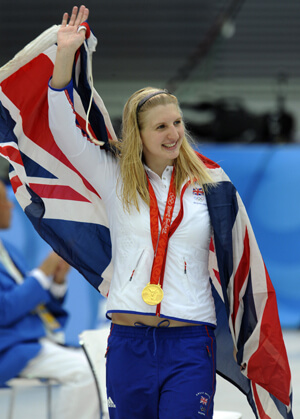
Trials and Tribulations
The following year was difficult for Adlington and one that had a knock-on effect for 2006 as she contracted glandular fever which saw her miss the 2005 World Championships in Montreal, Canada, and the 2006 Commonwealth Games in Melbourne.
But Adlington forged ahead. She won 800m silver on her senior international debut at the 2006 European Championships behind 2004 Olympic triple medallist Laure Manaudou who set a then European record of 8:19.29 ahead of the Briton in 8:27.88 and her national team-mate Cooke.
There was disappointment at the 2007 worlds in Melbourne where she failed to make the 800 final, finishing 10th, 4.73secs outside the cut.
Roll around 2008 and the British Olympic trials at Ponds Forge, Sheffield where finals were held in the morning to mirror the schedule in Beijing little more than four months later.
“I remember going into that trials,” said Adlington.
“I knew I had worked really hard, I knew it was kind of in the bag and it was such an emotional week.
“There’s so much on the line.”
Up first was the 400 free where Adlington – now 19 – lowered former Commonwealth champion Caitlin McClatchey’s British record by 2.11secs in the heats to 4:04.91 before slicing a further 0.41 in the final as she won gold in 4:04.50 ahead of friend Jo Jackson as both women punched their tickets for the Games.
Then to the 800 where she set a new British record of 8:19.22 before a dominant victory in the final – 9.54secs ahead of Cassie Patten – with former national record holder Cooke missing out in third prompting her retirement from the pool.
So, on a personal level, it had been a triumph for Adlington but the Olympic trials brings the spectrum of emotions from elation to devastation.
Mel Marshall was and remains a close friend of Adlington. She was targeting her second Olympics after a turbulent experience in Athens four years earlier.
Marshall was the owner of world and European medals and in 2006 paid six trips to the Commonwealth podium.
But calamity befell her when she missed the call room ahead of the 100m freestyle in which she was the former national record holder.
Marshall was out of the race and her inclusion lay entirely in her making the team in the 200 free – which she eventually did to book her spot in the relay as Adlington won her third title.
But not before tears, anxiety and the prospect of the Games slipping away.
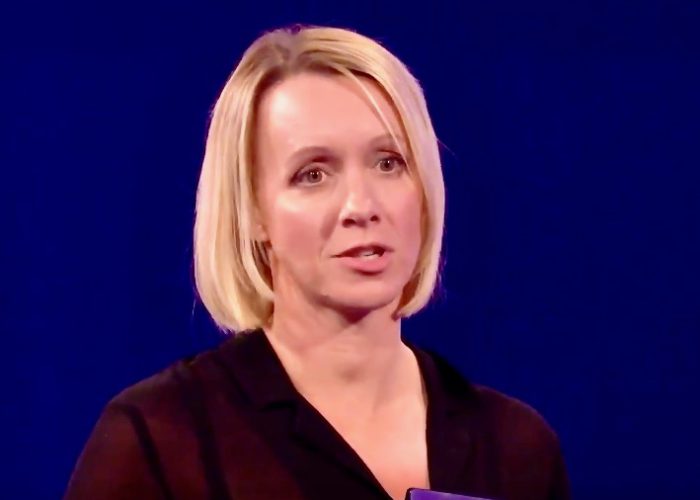
Melanie Marshall – Photo Courtesy: Action Woman Twitter
Adlington said: “It was so emotional: everything going on with Mel missing the call room and stuff.
“You are seeing your friends over the moon or like Mel and Becky Cooke who are just devastated and you feel terrible for them.
“You go back to your room after your session and I remember feeling so emotionally drained every night because I was so happy that I was swimming well but there was a couple of other guys on the team that hadn’t swum so well.
“It was a totally different environment: it was a lot more intense and serious. It was such a heavy thing.”
She added:
“That was a real hard thing I found with both Olympic trials: probably more so with London.
“I remember swimming really well that week and I was absolutely buzzing I had done PBs let alone made the team.
“It had been a few years since I had done PBs with all my illness and everything I had been through.
“The worlds the year before I had just swum awful so for me I was just so happy to be swimming well again.
“To then be making the team was unbelievable, I couldn’t believe it.”
Lost For Words In Beijing
Adlington had visited Beijing with the British team on their return from the Melbourne worlds and the team managers had given talks and prepared films of what to expect.
However, her arrival left Adlington lost for words.
“I had never experienced anything like it. I felt like I didn’t talk for two days, I was just trying to absorb everything.
“I am one of those people that when I’m feeling overwhelmed I take a bit of a step back. Even though I’m quite loud and out there I’m one of those people that as soon as I am out of my comfort zone I take a step back for a second to stay at the back and take it all in. That is how I absorb stuff.
“And I remember that in Beijing. I remember getting there and it being totally different because we had been the year before to do the Great Wall because they wanted us to see the village and everything like that.
“But the weather hadn’t been great, there was so much smog we couldn’t really see anything: but then it was totally different for the Olympics. They shut all the factories down, the weather was blue skies, the Village was just amazing.”
The girl from Mansfield, a small town in the English midlands, was mesmerised.
“It’s like when you go to Disneyland for the first time and you go through the gates and you just see the castle.
“And it was almost that moment: when you go back to being a kid.
“And seeing the dining room for the first time and how big it was: I’d never been to a Commonwealth Games or any village environment at all, we had always just stayed in hotels. So for me it was totally different to anything I had ever experienced.”
One of Adlington’s most vivid memories is now especially poignant given the loss of sporting superstar Kobe Bryant, this interview conducted before his death.
She adds:
“I remember the first day we got there Kobe Bryant walked past us. And we were like what?
“I had never seen anyone famous before – ever. I’m from Mansfield.
“So all of a sudden you’ve got these American basketball players walking around, David Beckham was in the village, Rafa Nadal, these people I am just in awe of that you are like ‘oh my God’.
“You just end up staring – I felt like I just stared at people for two days. Just because I was taking it all in.”
Adlington had contracted a chest infection at the holding camp in Osaka, Japan, which meant she stayed in her room much of the time.
A godsend came in the form of a quiet pool to which the British team had access so every day Adlington and Furniss would take the bus there, one that had many benefits for the Olympic debutant.
“It was getting away from it a little bit, taking that step back. When you go down to the pool you end up watching other people, see other people, you can’t really train properly because 10 other people are in your lane.
“For me going to the quiet pool I massively recommend – that would be my best advice.
“If you are not used to that environment and this is your first Olympics, be as normal as you can.
“Take a box set that you are used to watching on TV at home, take as many home comforts that make you feel it’s normal because everything else is so different – the food, the environment, everything is just heightened and intense and so different you need those little snippets of normality.
“For me just going to the quiet pool, just me and Bill, doing the training that we needed to do, just grounded me and concentrated it on what I was there to do which is the main thing at the end of the day.”
Golden Moments Mingled With Relay Agony
August 10 and Adlington lowered her British record to 4:02.24 to qualify second in the 400 free, 0.05secs behind world-record holder Federica Pellegrini with Katie Hoff third through and defending champion Manaudou squeaking through in eighth.
The following morning Adlington lined up in lane five, Pellegrini one to her right and Hoff beyond that.
The American led at the final turn ahead of Jackson and Coralie Balmy of France but with 30m to go the field was steadily cutting into Hoff’s lead.
It was Adlington who came quickest in the end to get her hand to the wall first in 4:03.22, 0.07secs ahead of Hoff with Jackson third in 4:03.52.
Britain had had a long wait for a female champion in the pool – 48 years to be precise – with Adlington the first since Anita Lonsbrough in Rome, the 1960 200m breaststroke champion looking on proudly from the press box in the Water Cube.
Now Britain had not just one but two women on the podium and Adlington and Jackson embraced, the pair lost for words and unable to comprehend what had unfolded.
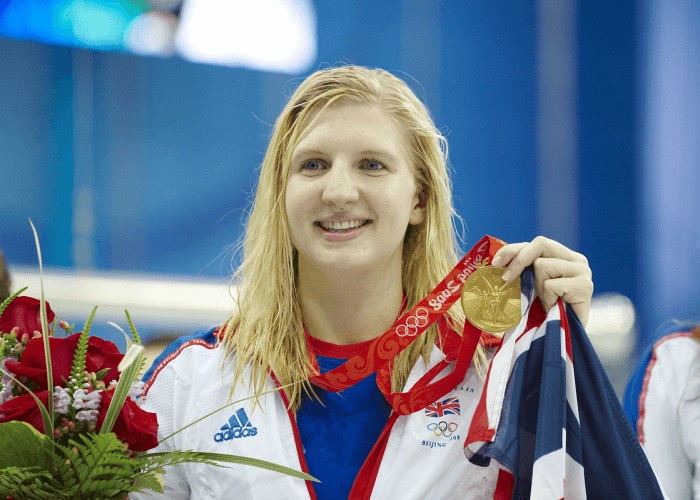
Photo Courtesy: Heinz Klutetmeier
“I just couldn’t believe it.
“I was like that can’t be right and then it sunk in and Jo was in the next lane to me and I can remember looking at Jo and going ‘what the hell just happened?’
“Both of us were just speechless and coming from me and Jo that’s very hard because we are never speechless.
“But both of us couldn’t really say anything, we couldn’t believe it, we were both in shock and gave each other a hug.
“I can even remember walking down to Sharron (Davies, BBC presenter and 1980 400IM silver medallist) and both of us were shaking our heads and laughing and smiling and going what just happened? Neither of us could process it.
“It was beyond our wildest dreams, it was something I never thought was possible.
“I don’t even think I properly celebrated because it just hadn’t sunk in. I don’t even think – like Adam (Peaty) gets up on the lane rope – I don’t think I even did any of that. I just did this little cheer and waved my hand because I just could not believe it.
“With the 400, my goal was just to make the final. I never thought it was possible to even win a medal. It had never been something me and Bill had even discussed as a possibility and that is not in a negative way: we had never voiced it to each other.”
The 800 was a different race entirely. She set a new Olympic record of 8:18.06 and come the final, Adlington led for all but 50m.
When she touched not only had she won a second gold, the teenager had broken Janet Evans’ 19-year world record, cutting 2.12secs in 8:14.10.
Evans – whose mark of 8:16.22 had been set at the Pan-Pacific Championships in Tokyo in 1989 – was in the Water Cube that night, looking on as Adlington led an all-European podium ahead of Alessia Filippi of Italy and Friis of Denmark.
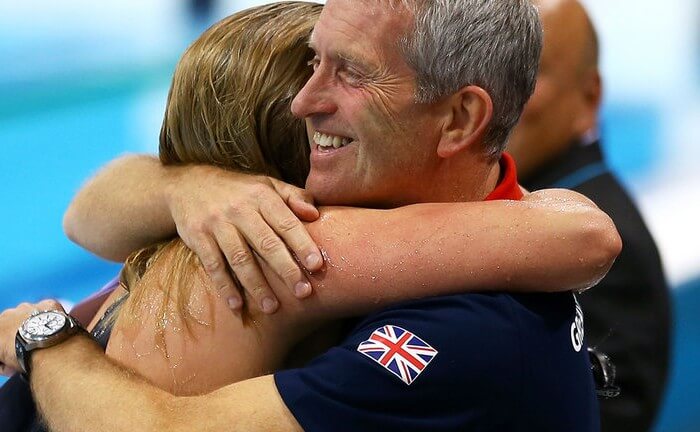
Becky Adlington & coach Bill Furniss
Adlington recalls:
“I woke up and just felt ready. It’s the only time in my career – even post-Beijing – that I turned round to Bill and shut him up.
“He was talking to me before the call room and I said ‘I’m ready, you don’t need to say anything’.
“And I’d never done that to him before. Both of us I think just knew: he didn’t contest it, he didn’t over-complicate anything.
“I was super-nervous beforehand: I remember saying to Bill, ‘I’m going to be sick’. And he tapped me on the head and said ‘it’s just your body getting ready to race’.
“And I was like ‘well, that’s not really helpful but thanks’ but I think he just knew. We were really relaxed to be honest: nervous but relaxed.”
She adds:
“I remember the race being so painful: I remember my shins burning. I remember the feeling of being on fire; my legs hurt so much. I felt I couldn’t keep kicking: obviously I did but I felt my legs were going to explode.
“I kind of thought I was winning but I could see that Bill was going mental and I thought someone was chasing me back.
“And I knew Filippi she always negative split, that was the way she raced, and I knew she was going to come back like a train.
“So Bill knew I was on world-record pace but I didn’t. So I put my head down and in the last 200m just kept going but it was a totally different race knowing I didn’t have somebody next to me, challenging me, it wasn’t like the 400 when I had Jo next to me and Katie (Hoff).
“So when I finished and saw I broke the world record, I honestly didn’t expect that.
“I thought I was going to go something like an 8:17, 18. That was my hope. So to go faster than that was such a shock.”
Two races. Two gold medals. But as is the way of sport, elation co-exists with desolation and Beijing was no different.
Great Britain had a strong 4x200m line-up with Adlington, Jackson, Marshall and McClatchey – sixth in the individual final – and all of them with individual medals on the global stage.
Adlington was rested as had always been the intention as was McClatchey with IM specialist Hannah Miley drafted in and Fran Halsall, who would be eighth in the individual 100 free, on the anchor leg.
It started well enough with Jackson the second quickest of the entire field in 1:57.70 handing on to Marshall who went 1:58.44 with the team well placed to qualify.
Miley then swam 1:59.95 to keep the quartet in touch but Halsall, a sprint specialist if there ever was one, could not maintain it over four lengths, splitting 2:00.07.
The team finished in 7:56.16, locked out of the final by one place in ninth, 0.53secs behind Japan who occupied the last slot.
Adlington recalls:
“Me and Caitlin were sat watching it. We just burst into tears and gave each other a hug.
“No-one knew what to say and it was such a hard thing because it wasn’t our decision to rest both of us: it was out of our hands as swimmers.
“We didn’t decide that, that was the coaching staff and the team that had made that decision and we had that opportunity taken from us, especially for Caitlin it was just really hard.
“So that had been a really emotional couple of days. I was on such a high of swimming well personally but I felt so bad for the team and really wanted that opportunity to swim the 4×2 that that was a real bring-you-back-down-to-reality moment in between.”
She added:
“So to get that second gold I was just so happy and remember going back to Bill and he was like I want to be the first person to say you’re double Olympic champion.
“And I just genuinely couldn’t believe it. My parents were out there for that one so that was a perfect movie moment.
“If ever there was going to be a movie moment in my life it was that one because it was a perfect sequence of events: seeing Bill, my parents, they came up on the screen, the world record – it was just something you dream about, it was unbelievable.”
In The Glare Of The Spotlight
Unbeknown to Adlington, she had become a huge star back home in Britain. There were no English TV channels or newspapers and social media was not as prevalent in 2008 as it is today.
So too did her parents shield her, not letting on how they had been experienced intense press attention following her 400 victory before they flew out for her 800.
It wasn’t until her return to Britain that she learned of what they had been subject to for 14 hours the day she stood atop the podium thousands of miles away.
“They had people going through our wardrobes, taking photos out of photo albums and frames.
“They thought they had free rein: parents had no clue, no manager to facilitate it. No-one helping.
“Bombarded and exhausted.
“If I had known that I would have been so worried.”
While Adlington had become the nation’s sweetheart, darker forces were also at work. Faceless cowards tapping away on a keyboard started to abuse and criticise her on social media.
On one occasion after she met the Queen, the abuse was so vicious that it tarnished her day.
She recently admitted it had affected her mental health, leading to panic attacks following her retirement in 2013.
A Home Games
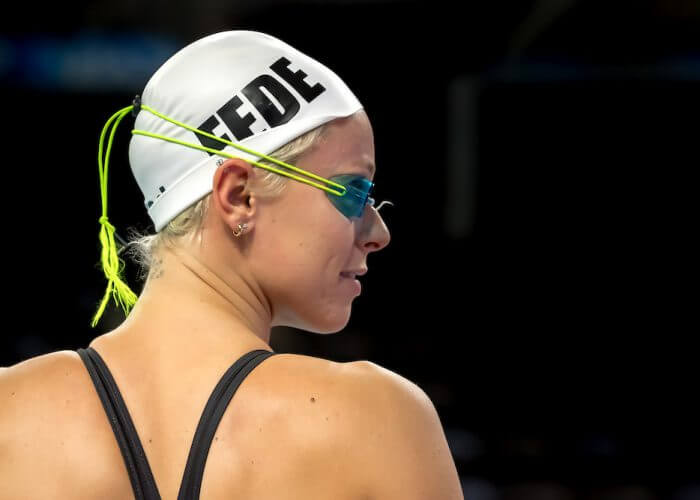
Federica Pellegrini; Photo Courtesy: Andrea Staccioli / Insidefoto / Deepbluemedia
Four years on and four years wiser, Adlington had experienced highs and lows during those times.
She was an emotional fourth in the 800m at the 2009 worlds in Rome, where world records tumbled amid the shiny suit circus, before 400 bronze in a race where Pellegrini scorched to the first sub-four-minute swim by a woman.
There were European and Commonwealth titles and a stroke-for-stroke tussle with Friis over 800m at the 2011 worlds in Shanghai from which the Briton emerged victorious.
An Olympic trials – so much more intense as everyone wanted to be at a home Games – were negotiated at the Aquatics Centre, where the Games would be staged months later.
It meant there was no wow factor as in Beijing but familiarity, no travel or jet lag to contend with, the presence of family and friends and the support of the public were some of the benefits.
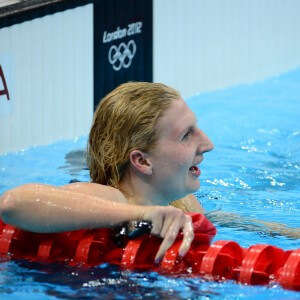
Photo Courtesy: Kyle Terada-USA TODAY Sports
Adlington just reached the final of the 400m in eighth place and the race for gold was a real tussle between Frenchwoman Camille Muffat, who died in a helicopter accident in 2015, and Allison Schmitt of the United States.
Adlington, in lane one, moved up to fourth at 300m and was into third at the final turn from when she produced a storming last 50 to clinch bronze behind Muffat and Schmitt.
Come the 800m and Adlington qualified fastest for the final ahead of Friis and a young American swimmer called Katie Ledecky.
What would unfold? Some expected a duel a la Shanghai between Adlington and Friis, others were looking on with eyebrows raised at Ledecky, just 15 but with wisdom and maturity that belied those years. And an armoury of heavy-duty talent and drive.
And so it came to pass. Ledecky went out from the front and that was how it stayed, the youngster winning in 8:14.63, the second-fastest time in history and one bettered only by Adlington.
The Briton was overhauled by Mireia Belmonte with 200m to go for silver (8:18.76) with Adlington claiming her second bronze of the competition and her fourth Olympic medal in 8:20.32.
A visibly emotional Adlington later broke down in tears on the podium as she was given a standing ovation by crowds that chanted her name.
The support she received at the Aquatics Centre has lived long with Adlington who says:
“For me having the crowd cheering for you was a moment I had never experienced.
“The best crowd I experienced was Rome in 2009 and because I was racing Pellegrini that crowd was just insane.
“I had only ever experienced it for other people so to have that home Olympics and to have that experience.
“In London getting the bronze medal wasn’t necessarily the best result I could have hoped for but at the same time in no other country could I have got the reaction from the crowd that I did.”
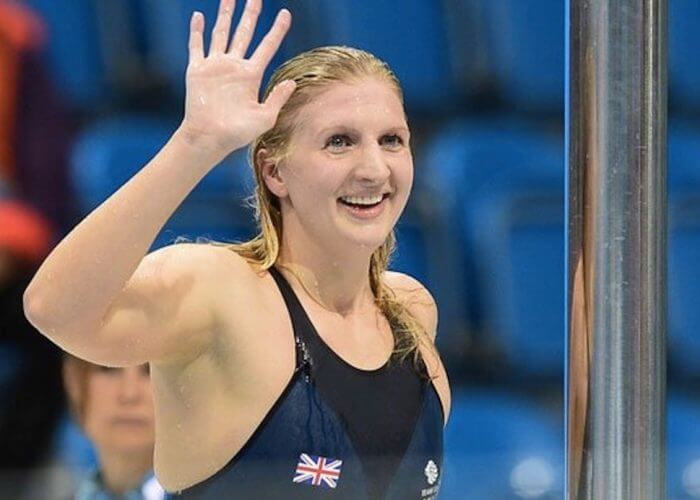
Rebecca Adlington – Photo Courtesy: British Swimming
And so concluded Adlington’s Olympic career. Two gold and two bronze medals. The most successful British swimmer of the modern era.
How does four medals from four Olympic finals sound to Adlington eight years on and now the mother of four-year-old daughter Summer and a successful businesswoman?
“It’s something I never really see in that way which is really weird.
“When I think about it like that I’m like ‘oh my God’ but I guess when it’s happening to you, you think of it so differently.
“In London not swimming anywhere near my PB in the 800, there is still that element of ‘oh God, I didn’t do as well as I wanted to there’.
“So there is always that slight negative side to it for me personally but only because as an athlete you are constantly striving to get faster and better whereas actually it’s nice that now eight years on I am more just proud of those moments and everything that I have been through.”
She adds:
“Summer is only four but she has come home from school a few times and said someone in the older class said to her that mummy was the champion – is that right?
“She doesn’t have a clue – but it is amazing.
“So I do appreciate now more how incredible that was – at the time you don’t think about it in that sense.
“I am so happy that the stuff I achieved was at an Olympics.
“I know I did the other stuff but I did have lots of bad swims in my career, I’m not like an Adam Peaty that has won absolutely everything and been unbeaten.
“For me I am so glad that I managed to peak at the right times and get those Olympic medals.
“I am so grateful that Bill and me managed to get that timing right and do it at an Olympic Games because they’re the ones that truly you want to succeed at.”
Respect For The Woman Who Has Taken Distance Swimming Through A Time Warp
It would be remiss not to ask if there is a female swimmer in particular that she looks up to.
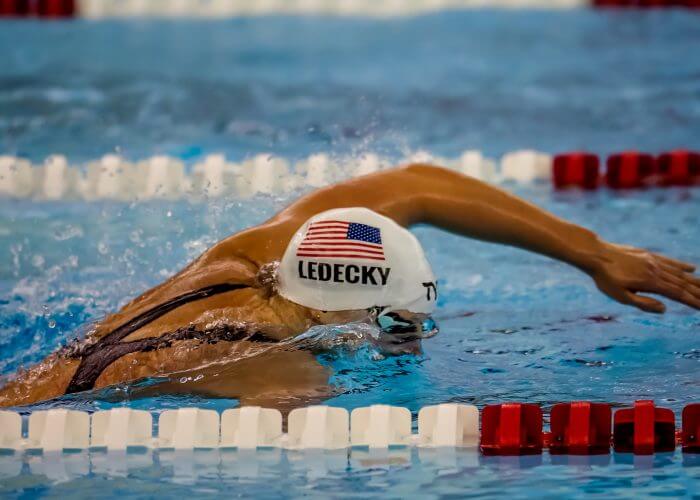
Katie Ledecky. Photo Courtesy: Peter H. Bick
And the answer comes without hesitation.
“Katie Ledecky. 100%. I only crossed paths with her in London and she was just so lovely and she was absolutely brilliant after that event.
“And then seeing her break my world record I was just like ‘yes Katie!’
“I was so pleased for her and so pleased that she has just transformed women’s distance freestyle.
“She has just set the bar unbelievably high: no-one else has even been close to her on those distances.
“She has totally changed it, been a great breath of fresh air for women’s distance swimming because with her technique – how she swims, how she attacks it – she is just a real credit and a real ambassador for the sport.
“She wrote me a really lovely letter after London congratulating me on my career and saying she had watched me in Beijing and been inspired. She didn’t have to do that at all.
“Every time I’ve been to a big competition I have gone over and given her a hug and asked her how she was and even her parents came over to me in Rio and introduced themselves.
“That letter that came from Katie with all the things she has achieved will mean so much more to me than so many other things that have happened in my life.
“I just could not be a bigger fan of Katie: she is the complete package.
“How she conducts herself, she is so professional, her attitude – everything, she is the ultimate athlete for me.”



